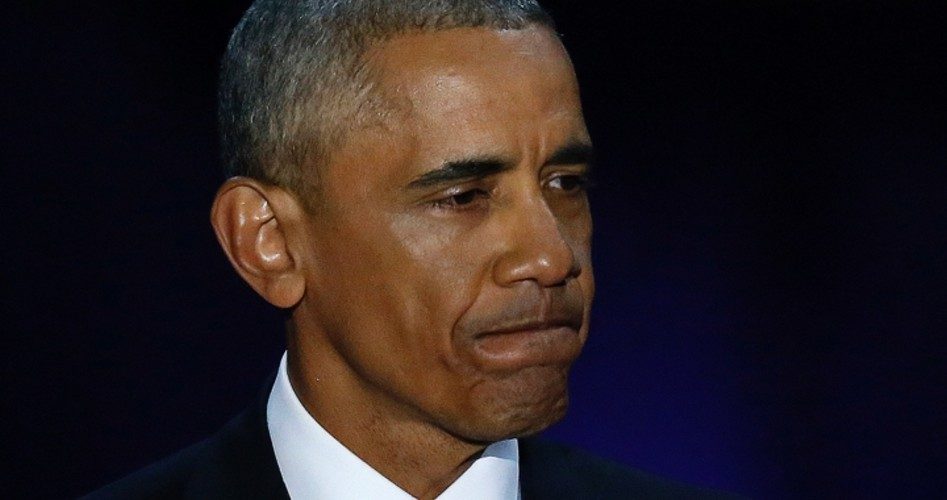
In a thinly veiled warning to incoming president Donald Trump, President Barack Obama celebrated the one-year anniversary of the Iranian nuclear deal on Monday by warning Trump that undoing the agreement — formally called the Joint Comprehensive Plan of Action, or JCPOA — would result in much worse consequences:
The Iran deal must be measured against the alternatives. A diplomatic resolution that prevents Iran from obtaining a nuclear weapon is far preferable to an unconstrained Iranian nuclear program, or another war in the Middle East.
The United States must remember that this agreement was the result of years of work, and represents an agreement between the world’s major powers — not simply the United States and Iran.
But although Obama reminded us that the agreement includes other “major powers” — China, France, Russia, the United Kingdom, Germany, and the European Union — in addition to the United States, he neglected to mention that the U.S. Senate had never ratified the treaty, as is required by the U.S. Constitution. Obama instead pretended that the agreement was not a treaty and claimed the authority to commit the United States via executive decree, as if he were a king or dictator.
Negotiations began informally in secret talks in early 2013 and were made public after some apparent progress had been made. The agreement was finalized in the summer of 2015 and made effective on January 16, 2016.
At the time President Obama threatened to veto any attempt by Congress to thwart the agreement: “I am confident that this deal will meet the national security needs of the United States and our allies, so I will veto any legislation that prevents the successful implementation of this deal.” Of course, many in Congress took issue with the administation’s claim that the agreement “will meet the national security needs of the United States,” since Iran is a supporter of terrorism. And during his presidential campaign, Donald Trump has variously promised to 1) dump the agreement; 2) renegotiate the agreement; or 3) enforce it so rigorously as to force Iran to withdraw from it unilaterally.
As part of the deal the United States released $150 billion in frozen funds, some of which Secretary of State John Kerry said would likely wind up in the hands of Iran’s Revolutionary Guard Corps:
I think that some of it will end up in the hands of the IRGC or other entities, some of which are labeled [by the Department of State!] as terrorists.
You know … I’m not going to sit here and tell you that every component of that can be prevented.
In that interview, conducted just five days after the deal was made effective last January, Kerry then added what many have concluded was the most worthless, self-effacing and gratuitous remark on record in defending the agreement:
We have made it very clear that we will use sanctions when we think they are appropriate in order to counter behavior that we believe has broken the law or has challenged the United Nations Security Council or threatened the United States, and we stand by our sanctions.
We think they have been used judiciously and effectively and we are looking to move on now to put to test the willingness of Iran and other countries in the region to try to reduce tensions and move in a different direction.
And, according to Kerry, if they do cheat, then they’ll have to face the wrath of the American people: “If we catch them funding terrorism, they are going to have a problem with the United States Congress and other people, obviously.”
The U.S. State Department has for years described Iran as an “active state sponsor of terrorism”, with former Secretary of State Condoleeza Rice elaborating: “Iran has been the country that has been in many ways kind of central banker for terrorism … in the Middle East.”
Iran has already violated the agreement. Wrote the Washington Post: “When Iran surpassed the agreed-upon limits for heavy water used in some nuclear reactors, the U.S. government bought the excess for commercial resale.”
Mark Dubowitz, the executive director of the Foundation for Defense of Democracies (and a critic of the Iran deal), opined, “There’s a recognition in the incoming [Trump] team that the regime cheats incrementally, not egregiously, even though the sum total of cheating turns out to be egregious.”
Some are already saying the Iran deal is in desperate trouble, even among its supporters. Trita Parsi, head of the National Iranian American Council, said, “The deal is in tremendous danger. Iranians are building up their case to make sure that once the deal falls apart, they can point to a strong record of the U.S. causing it. It’s going to be part of the cost the [incoming] administration will have to decide if it’s willing to pay.”
With Trump’s view that foreign policy must be viewed through the lens of “America First,” he may not concern himself too much about the reaction of other parties if he were to decide it’s in the best interest of the United States to renegotiate or back out of a treaty that was never ratified by the U.S. Senate to begin with.
Photo of President Obama: AP Images
An Ivy League graduate and former investment advisor, Bob is a regular contributor to The New American magazine and blogs frequently at LightFromTheRight.com, primarily on economics and politics. He can be reached at [email protected].



